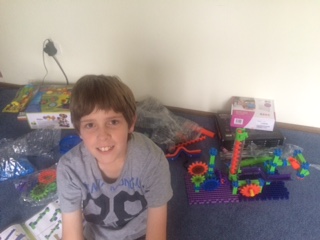Woo Hoo! Oh yeah!
This is what I am shouting in my brain while doing a crazy celebratory dance.
I have just spent the last 30 minutes sitting on the loungeroom floor with Geordie, ‘helping’ him build his marble run.
I say ‘helping’ because I generally suck at this sort of thing – this bit screws on to that bit, which sits inside piece 5 – ‘Aaargghh!’
But Geordie made great progress with this contraption that appears to have a million pieces – at least, that’s what it looks like spread all over the carpet.
‘So what?’
So … Geordie was given this marble run as a birthday present two years ago. It has sat in the box for two years. Today it received its virgin opening.
When I heard the crash-bang as Geordie wrenched the box from the back of his wardrobe, then saw him carry it down the hallway into the loungeroom, I thought, ‘Uh-oh.’ I honestly believed that it would not end well.
Geordie is a real perfectionist. In the past, the perfect recipe for a meltdown involves trying to do something and not getting it perfect the first time.
This is not the first time I have misjudged my son.
Geordie rarely attempts a new skill until he knows, in his head, he can achieve it; taking his first steps, talking, riding a tricycle and writing his name are just a few examples of new skills that I despaired Geordie would ever attempt. When he finally did, with each and every one, they were spot on the first time.
I should have known that building a marble run from a book of dodgy pictorial instructions would be the same.
Same, but different.
I sat down on the floor with Geordie after he had unwrapped all the pieces.
‘Need some help?’ I asked.
‘No,’ smiling, ‘but you can stay here if you like.’
So, I watched as Geordie diligently and methodically followed the instructions. I watched in awe as the marble run started to take shape.
Then, I held my breath, mentally going through what I would do to stop the meltdown, when Geordie realised that he had made a mistake.
He shook his head, muttered something I didn’t hear … and …
… he turned back a few pages, offending piece in hand, and brow furrowed, ran his fingers over the instructions until he found the error.
Then he fixed it – and kept going!
No meltdown! Not even a hint of one.
At one point, he asked for my assistance and together we solved the issue of the shovel not fitting correctly.
30 minutes on the floor with my son has brought home three things:
- Geordie is still a perfectionist. He is likely to always be like that, and that’s ok. What right do I have to push him to do things before he is ready?
- Geordie has, at the age of 11, matured to the point where failure frustrates him, but no longer disables him to the point where the activity is condemned to the scrapheap.
- Logic, perseverance and resilience – three things he did not possess in the past now seem to be part of his character set.
Why should I celebrate this?
It is so hard to explain the feeling of complete and boundless joy I felt watching this scenario unfold.
It is the first time I have seen Geordie fail and not give up.
Maybe I won’t see it again for a while, but at least I have seen it.

This has been the best 30 minutes of my day.


 Who doesn’t love the characters of Mr Bean and Dr Sheldon Cooper?
Who doesn’t love the characters of Mr Bean and Dr Sheldon Cooper?